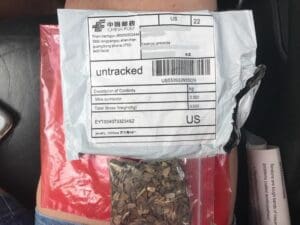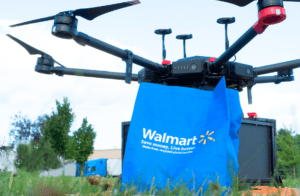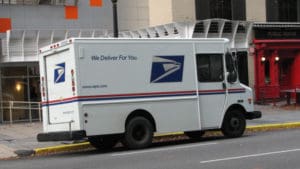 Over the last few months, I’ve seen stories about people receiving random, unidentified seeds in the mail. Usually, the package came from China and had something else listed as the contents on the outside. However, once it was opened, there were just seeds with no description. The USDA in July said the packages were most likely part of a “brushing” scam, in which people receive unsolicited items from a seller who then posts false positive customer reviews to boost sales. This week, Amazon said it has banned foreign sales of seeds in the United States after thousands of Americans received unsolicited packages of seeds in their mailboxes, mostly postmarked from China. The US Department of Agriculture (USDA) in July identified more than a dozen plant species ranging from morning glories to mustard in the bags of unsolicited seeds. It warned Americans not to plant the seeds. Amazon will now only allow the sale of seeds from sellers who are based in the US. And now on to this week’s logistics news.
Over the last few months, I’ve seen stories about people receiving random, unidentified seeds in the mail. Usually, the package came from China and had something else listed as the contents on the outside. However, once it was opened, there were just seeds with no description. The USDA in July said the packages were most likely part of a “brushing” scam, in which people receive unsolicited items from a seller who then posts false positive customer reviews to boost sales. This week, Amazon said it has banned foreign sales of seeds in the United States after thousands of Americans received unsolicited packages of seeds in their mailboxes, mostly postmarked from China. The US Department of Agriculture (USDA) in July identified more than a dozen plant species ranging from morning glories to mustard in the bags of unsolicited seeds. It warned Americans not to plant the seeds. Amazon will now only allow the sale of seeds from sellers who are based in the US. And now on to this week’s logistics news.
- AstraZeneca pauses coronavirus vaccine trial after unexplained illness in volunteer
- Walmart in the news:
- Prescription deliveries significantly delayed by Postal Service
- Whole Foods to offer pickup from nearly all of its stores by end of month
- eBay, UPS enter into enhanced tie-up
- Kohl’s to help Amazon grow grocery footprint
- Mondelez tightens palm-oil supplier rules
 As we’ve written about before, the race is on to develop a vaccine for COVID-19. One of the world’s largest drug companies, AstraZeneca, has paused its global trials of its coronavirus vaccine because of an unexplained illness in one of the volunteers. According to reports, the participant came down with an inflammatory syndrome known as transverse myelitis, which results in inflammation of both sides of the spinal cord, interfering with how messages are sent throughout the body and potentially causing paralysis. The AstraZeneca vaccine is one of three coronavirus vaccines in late-stage, Phase 3 trials in the USA Data and Safety Monitoring Board. However, the company, along with eight other companies, signed a pledge that they would not seek premature government approval for any coronavirus vaccine. They promised they would wait until they had adequate data showing any potential vaccine worked safely. The company is testing its vaccine, called the Oxford vaccine because it was developed with Britain’s University of Oxford, in the United States as well as the UK, Latin America, Asia, Europe, and Africa.
As we’ve written about before, the race is on to develop a vaccine for COVID-19. One of the world’s largest drug companies, AstraZeneca, has paused its global trials of its coronavirus vaccine because of an unexplained illness in one of the volunteers. According to reports, the participant came down with an inflammatory syndrome known as transverse myelitis, which results in inflammation of both sides of the spinal cord, interfering with how messages are sent throughout the body and potentially causing paralysis. The AstraZeneca vaccine is one of three coronavirus vaccines in late-stage, Phase 3 trials in the USA Data and Safety Monitoring Board. However, the company, along with eight other companies, signed a pledge that they would not seek premature government approval for any coronavirus vaccine. They promised they would wait until they had adequate data showing any potential vaccine worked safely. The company is testing its vaccine, called the Oxford vaccine because it was developed with Britain’s University of Oxford, in the United States as well as the UK, Latin America, Asia, Europe, and Africa.
 Walmart has started making its first deliveries by drone, launching a small pilot program this week in Fayetteville, NC. The retailer will be delivering “select grocery and household essential items” using automated drones operated by Israeli startup Flytrex. Each of the drones can fly at speeds of 32 mph, travel distances of 6.2 miles in a round trip, and carry up to 6.6 pounds. Unlike other trials that its rivals are performing, Walmart is not seeking direct certification by the FAA. Instead, by partnering with Flytrex, which is already part of the FAA’s UAS Integration Pilot Program, the company can avoid the need for its own certification.
Walmart has started making its first deliveries by drone, launching a small pilot program this week in Fayetteville, NC. The retailer will be delivering “select grocery and household essential items” using automated drones operated by Israeli startup Flytrex. Each of the drones can fly at speeds of 32 mph, travel distances of 6.2 miles in a round trip, and carry up to 6.6 pounds. Unlike other trials that its rivals are performing, Walmart is not seeking direct certification by the FAA. Instead, by partnering with Flytrex, which is already part of the FAA’s UAS Integration Pilot Program, the company can avoid the need for its own certification.
Every year as the holiday season approaches, Walmart invites hundreds of kids to a convention center near it headquarters to test out toys to see if they would want them for Christmas. This has helped shape the company’s “top toys list” year after year. This year is a little different, as the company clearly cannot invite hundreds of kids to an enclosed location to play with toys. Instead, it has mailed toys to several dozen kids to test at home. Walmart also developed an online tool that lets kids virtually unbox, test, and play with toys since multiple kids can’t wheel around the same truck or play with the same doll in store aisles or at demos due to the pandemic. Walmart Wonder Lab will allow kids to try over 100 toys and guide virtual hands to interact with them.
 According to the results of an investigation by two Senate Democrats released this week, changes to the USPS instituted by Postmaster General Louis DeJoy have caused “significant delays” in the delivery of mail-order prescriptions to millions of Americans. The investigation found that average delivery times for prescription drugs increased 18 percent to 32 percent after DeJoy had changed delivery policies. Prescription drugs are typically delivered within two to three days since many are temperature sensitive and patients may require them immediately. But the delays caused by DeJoy’s changes have created new cost burdens that affect the federal government, consumers and taxpayers, the report said.
According to the results of an investigation by two Senate Democrats released this week, changes to the USPS instituted by Postmaster General Louis DeJoy have caused “significant delays” in the delivery of mail-order prescriptions to millions of Americans. The investigation found that average delivery times for prescription drugs increased 18 percent to 32 percent after DeJoy had changed delivery policies. Prescription drugs are typically delivered within two to three days since many are temperature sensitive and patients may require them immediately. But the delays caused by DeJoy’s changes have created new cost burdens that affect the federal government, consumers and taxpayers, the report said.
 As online grocery demand has soared over the last six months, companies like Whole Foods have increased their curbside pick-up capabilities and capacity to mee the growing demand. Whole Foods’ pickup service, which for Amazon Prime members doesn’t carry a fee on orders over $35 and can be available within an hour. The company is now getting ready to offer grocery pick-up at nearly every location nationwide by the end of the month. According to reports, some Whole Foods stores are removing in-store dining and seating space to make room for pickup staging.
As online grocery demand has soared over the last six months, companies like Whole Foods have increased their curbside pick-up capabilities and capacity to mee the growing demand. Whole Foods’ pickup service, which for Amazon Prime members doesn’t carry a fee on orders over $35 and can be available within an hour. The company is now getting ready to offer grocery pick-up at nearly every location nationwide by the end of the month. According to reports, some Whole Foods stores are removing in-store dining and seating space to make room for pickup staging.
 eBay has announced that they have expanded their shipping relationship and, for the first time, will integrate UPS’ services with eBay’s global platform, a move that eBay said will offer its millions of sellers easier and deeper access to the carrier’s package-delivery portfolio. UPS has been handling the shipping for eBay sellers for years, but the process was not always simple. Sellers would need to go to UPS’ website to print out shipping labels. Under the new agreement, UPS will be integrated into the eBay label-printing function on its platform. This also means that eBay sellers will receive discounts on UPS’ second-day air and ground service; sellers will also have access to UPS’ 85,000 drop-off locations.
eBay has announced that they have expanded their shipping relationship and, for the first time, will integrate UPS’ services with eBay’s global platform, a move that eBay said will offer its millions of sellers easier and deeper access to the carrier’s package-delivery portfolio. UPS has been handling the shipping for eBay sellers for years, but the process was not always simple. Sellers would need to go to UPS’ website to print out shipping labels. Under the new agreement, UPS will be integrated into the eBay label-printing function on its platform. This also means that eBay sellers will receive discounts on UPS’ second-day air and ground service; sellers will also have access to UPS’ 85,000 drop-off locations.
![]() Amazon and Kohl’s launched a partnership a few years back that allowed consumers to return Amazon purchases in Kohl’s brick and mortar stores. The two companies are now expanding that partnership. The Milwaukee Business Journal is reporting that Kohl’s will allow an Amazon grocery store, likely its new banner called Fresh, to occupy space in a Kohl’s store in La Verne, California. According to city records, Kohl’s would occupy about 50,900 square feet of the 88,000-square-foot box, with the Amazon grocery store filling the remainder.
Amazon and Kohl’s launched a partnership a few years back that allowed consumers to return Amazon purchases in Kohl’s brick and mortar stores. The two companies are now expanding that partnership. The Milwaukee Business Journal is reporting that Kohl’s will allow an Amazon grocery store, likely its new banner called Fresh, to occupy space in a Kohl’s store in La Verne, California. According to city records, Kohl’s would occupy about 50,900 square feet of the 88,000-square-foot box, with the Amazon grocery store filling the remainder.
As sustainability efforts increase, there has been a lot of focus on palm oil sourcing. Mondelez International said it has tightened sourcing practices around palm oil, the ingredient used in various foods that has been linked for years to deforestation of tropical forests. The company said its suppliers of palm oil must demonstrate they can trace materials back to palm farms and have in place satellite monitoring covering large farms that feed mills that produce oil for the company. Suppliers must also identify all mills on Global Forest Watch, a platform created to monitor forests around the world, and take more action to stop worker exploitation within supply chains, Mondelez said.
That’s all for this week. Enjoy the weekend and the song of the week, The Seed (2.0) by the Roots featuring Cody ChesnuTT.
















